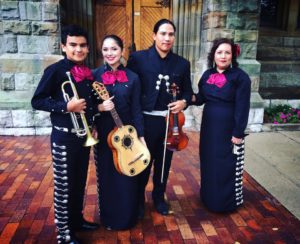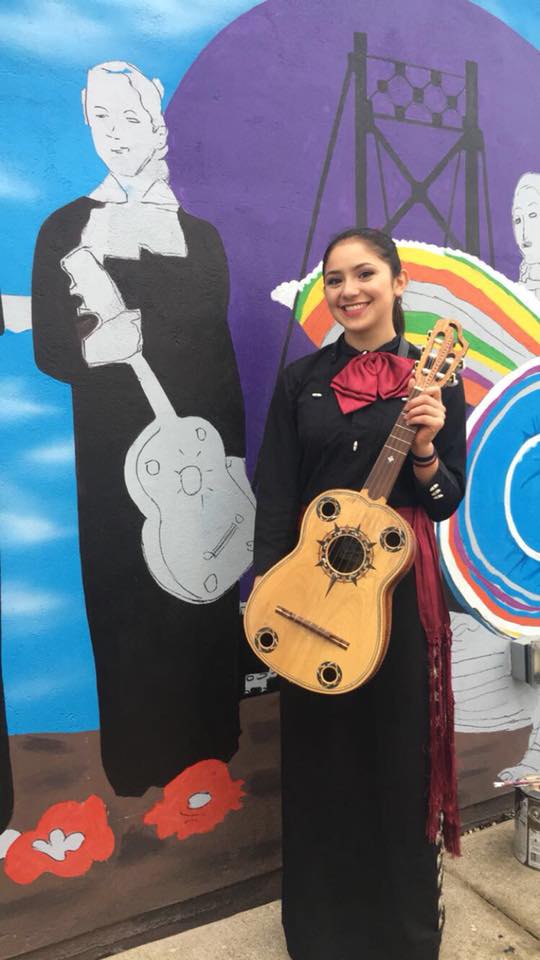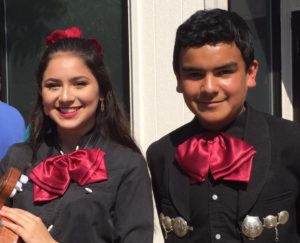Mariachi Femenil Detroit combats machismo and promotes female musicians
Maria Contreras-Cantu didn’t necessarily set out to become a business owner or cultural organizer when her children began attending Detroit Public Schools. With a background in social justice, criminal justice, and public policy, Contreras-Cantu believes you have to be the change you wish to see in the world. While she doesn’t consider herself an artist, she does consider herself an entrepreneur, and her business is Mariachi Femenil Detroit.
The 2017 Knight Arts Challenge Detroit grantee is a traditional mariachi group with an untraditional – at least by American standards – twist: the band is primarily female, and focuses on training, promoting, and highlighting female mariachi musicians.
 The concept of female mariachi is not so uncommon in the Mexican state of Jalisco, one of the states where mariachi originated and where Contreras-Cantu’s family is from. But, she explains, something happened in the process of immigrating to the United States: while Mexican culture in Mexico has become more woman-positive and progressive, Mexican culture in the U.S. – and specifically here in Detroit – has remained stuck in the old ways of Machismo, emphasizing male pride and male dominance to the point of exaggeratedly “masculine” identities at the expense of marginalized female identities.
The concept of female mariachi is not so uncommon in the Mexican state of Jalisco, one of the states where mariachi originated and where Contreras-Cantu’s family is from. But, she explains, something happened in the process of immigrating to the United States: while Mexican culture in Mexico has become more woman-positive and progressive, Mexican culture in the U.S. – and specifically here in Detroit – has remained stuck in the old ways of Machismo, emphasizing male pride and male dominance to the point of exaggeratedly “masculine” identities at the expense of marginalized female identities.
Contreras-Cantu is done with that. When her children joined DPS, her daughter was invited to join the group Mariachi Juvenil Detroit, a youth mariachi ensemble. As the music education teacher became sick with terminal cancer, Contreras-Cantu took over managing – and funding – the ensemble, which was becoming increasingly popular as it also combatted the stereotype of mariachi groups being older, male, and probably a little stodgy. The kids were young, suave, debonair, and the group had a female apprentice.

“They shined,” she says, and she supported them in whatever they needed – a place to practice, money for costumes, transportation to events, everything. Contreras-Cantu applied for a Knight grant on behalf of the group in 2015 and won.
But she and her daughter Camilla began to question why there weren’t more females in the group and why the females who did join didn’t stay for long. “We had the programs for them to join, so we just kept wondering why there weren’t more females in them.”
 Part of that 2015 grant included the creation of an all-female mariachi ensemble. Then, in the summer of 2016, Contreras-Cantu and her children split from Mariachi Juvenil to form Mariachi Femenil.
Part of that 2015 grant included the creation of an all-female mariachi ensemble. Then, in the summer of 2016, Contreras-Cantu and her children split from Mariachi Juvenil to form Mariachi Femenil.
“We did not have 100 percent support from the group,” Contreras-Cantu explains. “We were battling machismo within our own group. Everyone expected this project to fail because it was just me and my two kids.”
Camilla is now the Director of Music and Maria is the owner and manager. When the group split off, they immediately began recruiting female musicians but could only find vocalists. Contreras-Cantu says female vocalists are everywhere, but female musicians are much harder to find – girls, presumably, tend not to be taught to play instruments as boys are. So when they recruited the two vocalists, they also taught them how to play guitar.

The group is now comprised of three females and two males, ranging in ages from 16 to 50. When Contreras-Cantu and her daughter formed Mariachi Femenil, they wanted to empower female musicians and ensure it was open to everyone, so they made it an all-ages group. It is also open to male members, and the male members they have Contreras-Cantu says have been the groups “number one supporters” from day one.
“I recognize that without their support this would have been much harder,” she says. “Anyone who shows interest in joining the group, especially females musicians, we’ll take them.”
Mariachi Femenil performs community events as well as private parties, and with the Knight Arts Challenge Grant they will have the opportunity to host their own feature performances. As Director of Music, Camilla also wants to bring new music into the group’s repertoire and even create new music for the group.
The group is very much a passion project of the Cantu family, but, Contreras-Cantu says, they all remain steadfastly committed to it and it’s not going anywhere.
“We have a very dedicated team. We are not giving up. We are not getting tired. The people who are dedicated to the band are going to stay dedicated. We have a team that wants to grow.”
Contreras-Cantu says that she initially thought the group would be more controversial, but has found instead that they are much more accepted than not.

“Unfortunately still today there is a lot of Machismo,” she says. “It’s still a very stereotypical male-dominated culture, even with the young people, so sometimes there is a negative connotation with female mariachi and a belief that females shouldn’t be mariachi, but often times we find they are absolutely loved.”
She believes that in their little barrio of Southwest Detroit, and even in their city and their state, this is what has been missing from the mariachi scene.
“There is a history of it here but there is very little representation of female mariachi. We want to document all of their hard work and keep getting their presence known to other mariachi to show that this is not so much a project but a new trend that is going to continue to grow.”
If any audience members don’t seem initially receptive to the female mariachi, Contreras-Cantu says once they hear the band they change their minds. “You can almost read the audience’s minds when they change. You’ll see the looks in their eyes and hear the cheers. It’s pretty cool! Maybe the lack of female mariachi and the fear of the unknown intimidate people, but we’re here to teach them and we’re not going anywhere.”

(1) How do you like to collaborate?
We are very open to collaboration and we love to collaborate. We will work with anybody who supports our mission. This is where my “kid-speak” shows but [we won’t work with] any haters or anybody who has dissed the group, because you’re not just dissing the group, you’re dissing femininity and the power of womanhood so unfortunately no, we can’t work with you. Just no. But we have more love than haters. And now we’re working with bands that are Latin Grammy winners, so we think collaboration is great!
(2) How do you a start a project?
People have passions. People have desires. They want to change the world and see and do things differently. But if you don’t have that drive, passion without drive is fruitless. It’s important to first, understand your mission, and second, have some type of drive.
(3) How do you talk about your value?
As far as value what we’re doing is creating an impression as female artists on younger females. We’re paving a way in this community not just for vocalists but for musicians, which are two different things – there are different skills involved. The value is in paving the path for aspiring musicians and letting young people know, “You can do this. This is another outlet of creativity. It is here and we are here for you.” My daughter asked, “How long are we going to do this?” and I said, “Until we get taken over and someone takes our spot and do it better than us, then we will quit.” It is needed and there is value, especially for the next generation of inspiring musicians.
(4) How do you define success?
At first it was simple – it was the smiles in the audience and the way the groups were received. Now I define by the people who want to work with this band. We’re at the level that people are contracting us now. We have other musicians that want to work with the band. We have other people who want to work with the band and reach out to me through the community center for the band. Their reputation is growing because of their good work and people are coming to me for them, and that tells me this is a successful project. The band is getting pulled in different ways for community events, and that interest lets me know they are being accepted and there is a positive reception. Initially when people would call to book us and they learned it was female mariachi, one out of five calls would say, “No, never mind.” I haven’t heard that in awhile, and I think we have something to do with that.
(5) How do you fund your work?
Primarily it is my resources and out of my pocket. The incorporation is through my corporate finances. At this point they are an investment. I do not receive a return but with programs and grants like the Knight Arts Challenge I’m hoping to turn that whole thing around. The band members are paid performers, but I am an investor in my own company. I am a female entrepreneur.

These chicanas rock :
https://www.youtube.com/watch?v=9TfEmKdt49M